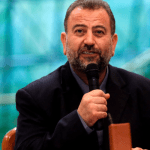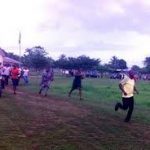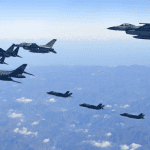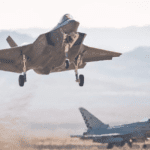Israeli airplanes broke the sound barrier three times over Beirut in less than 30 minutes on Tuesday, causing deafening booms that sent residents fleeing for shelter shortly before the commander of the powerful Iran-backed militia Hezbollah delivered a speech.
Witnesses reported seeing Israeli warplanes flying low over the Lebanese capital.
According to reports, the bangs were the loudest heard in Beirut in several years.
Hezbollah chief Sayyed Hassan Nasrallah was scheduled to deliver an address at around 5 p.m. (1400 GMT) to commemorate one week after the execution of the Lebanese armed group’s top military commander Fuad Shukr in an Israeli attack in Beirut’s southern suburbs.
Hezbollah has threatened to respond to the killing, which occurred just hours before Hamas leader Ismail Haniyeh was assassinated in Tehran in an operation blamed on Israel but which Israel has neither confirmed nor denied carrying out.
The twin killings have pushed the region to the brink of war, with Iran also vowing a painful response.
Israeli airplanes broke the sound barrier three times over Beirut in less than 30 minutes on Tuesday, causing deafening booms that sent residents fleeing for shelter shortly before the commander of the powerful Iran-backed militia Hezbollah delivered a speech.
Witnesses reported seeing Israeli warplanes flying low over the Lebanese capital.
According to reports, the bangs were the loudest heard in Beirut in several years.
Hezbollah chief Sayyed Hassan Nasrallah was scheduled to deliver an address at around 5 p.m. (1400 GMT) to commemorate one week after the execution of the Lebanese armed group’s top military commander Fuad Shukr in an Israeli attack in Beirut’s southern suburbs.
Hezbollah has threatened to respond to the killing, which occurred just hours before Hamas leader Ismail Haniyeh was assassinated in Tehran in an operation blamed on Israel but which Israel has neither confirmed nor denied carrying out.
The twin killings have pushed the region to the brink of war, with Iran also vowing a painful response.
Israeli airplanes broke the sound barrier three times over Beirut in less than 30 minutes on Tuesday, causing deafening booms that sent residents fleeing for shelter shortly before the commander of the powerful Iran-backed militia Hezbollah delivered a speech.
Witnesses reported seeing Israeli warplanes flying low over the Lebanese capital.
According to reports, the bangs were the loudest heard in Beirut in several years.
Hezbollah chief Sayyed Hassan Nasrallah was scheduled to deliver an address at around 5 p.m. (1400 GMT) to commemorate one week after the execution of the Lebanese armed group’s top military commander Fuad Shukr in an Israeli attack in Beirut’s southern suburbs.
Hezbollah has threatened to respond to the killing, which occurred just hours before Hamas leader Ismail Haniyeh was assassinated in Tehran in an operation blamed on Israel but which Israel has neither confirmed nor denied carrying out.
The twin killings have pushed the region to the brink of war, with Iran also vowing a painful response.
Israeli airplanes broke the sound barrier three times over Beirut in less than 30 minutes on Tuesday, causing deafening booms that sent residents fleeing for shelter shortly before the commander of the powerful Iran-backed militia Hezbollah delivered a speech.
Witnesses reported seeing Israeli warplanes flying low over the Lebanese capital.
According to reports, the bangs were the loudest heard in Beirut in several years.
Hezbollah chief Sayyed Hassan Nasrallah was scheduled to deliver an address at around 5 p.m. (1400 GMT) to commemorate one week after the execution of the Lebanese armed group’s top military commander Fuad Shukr in an Israeli attack in Beirut’s southern suburbs.
Hezbollah has threatened to respond to the killing, which occurred just hours before Hamas leader Ismail Haniyeh was assassinated in Tehran in an operation blamed on Israel but which Israel has neither confirmed nor denied carrying out.
The twin killings have pushed the region to the brink of war, with Iran also vowing a painful response.
Israeli airplanes broke the sound barrier three times over Beirut in less than 30 minutes on Tuesday, causing deafening booms that sent residents fleeing for shelter shortly before the commander of the powerful Iran-backed militia Hezbollah delivered a speech.
Witnesses reported seeing Israeli warplanes flying low over the Lebanese capital.
According to reports, the bangs were the loudest heard in Beirut in several years.
Hezbollah chief Sayyed Hassan Nasrallah was scheduled to deliver an address at around 5 p.m. (1400 GMT) to commemorate one week after the execution of the Lebanese armed group’s top military commander Fuad Shukr in an Israeli attack in Beirut’s southern suburbs.
Hezbollah has threatened to respond to the killing, which occurred just hours before Hamas leader Ismail Haniyeh was assassinated in Tehran in an operation blamed on Israel but which Israel has neither confirmed nor denied carrying out.
The twin killings have pushed the region to the brink of war, with Iran also vowing a painful response.
Israeli airplanes broke the sound barrier three times over Beirut in less than 30 minutes on Tuesday, causing deafening booms that sent residents fleeing for shelter shortly before the commander of the powerful Iran-backed militia Hezbollah delivered a speech.
Witnesses reported seeing Israeli warplanes flying low over the Lebanese capital.
According to reports, the bangs were the loudest heard in Beirut in several years.
Hezbollah chief Sayyed Hassan Nasrallah was scheduled to deliver an address at around 5 p.m. (1400 GMT) to commemorate one week after the execution of the Lebanese armed group’s top military commander Fuad Shukr in an Israeli attack in Beirut’s southern suburbs.
Hezbollah has threatened to respond to the killing, which occurred just hours before Hamas leader Ismail Haniyeh was assassinated in Tehran in an operation blamed on Israel but which Israel has neither confirmed nor denied carrying out.
The twin killings have pushed the region to the brink of war, with Iran also vowing a painful response.
Israeli airplanes broke the sound barrier three times over Beirut in less than 30 minutes on Tuesday, causing deafening booms that sent residents fleeing for shelter shortly before the commander of the powerful Iran-backed militia Hezbollah delivered a speech.
Witnesses reported seeing Israeli warplanes flying low over the Lebanese capital.
According to reports, the bangs were the loudest heard in Beirut in several years.
Hezbollah chief Sayyed Hassan Nasrallah was scheduled to deliver an address at around 5 p.m. (1400 GMT) to commemorate one week after the execution of the Lebanese armed group’s top military commander Fuad Shukr in an Israeli attack in Beirut’s southern suburbs.
Hezbollah has threatened to respond to the killing, which occurred just hours before Hamas leader Ismail Haniyeh was assassinated in Tehran in an operation blamed on Israel but which Israel has neither confirmed nor denied carrying out.
The twin killings have pushed the region to the brink of war, with Iran also vowing a painful response.
Israeli airplanes broke the sound barrier three times over Beirut in less than 30 minutes on Tuesday, causing deafening booms that sent residents fleeing for shelter shortly before the commander of the powerful Iran-backed militia Hezbollah delivered a speech.
Witnesses reported seeing Israeli warplanes flying low over the Lebanese capital.
According to reports, the bangs were the loudest heard in Beirut in several years.
Hezbollah chief Sayyed Hassan Nasrallah was scheduled to deliver an address at around 5 p.m. (1400 GMT) to commemorate one week after the execution of the Lebanese armed group’s top military commander Fuad Shukr in an Israeli attack in Beirut’s southern suburbs.
Hezbollah has threatened to respond to the killing, which occurred just hours before Hamas leader Ismail Haniyeh was assassinated in Tehran in an operation blamed on Israel but which Israel has neither confirmed nor denied carrying out.
The twin killings have pushed the region to the brink of war, with Iran also vowing a painful response.














